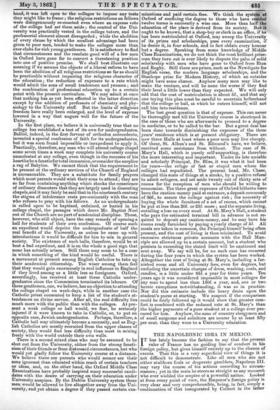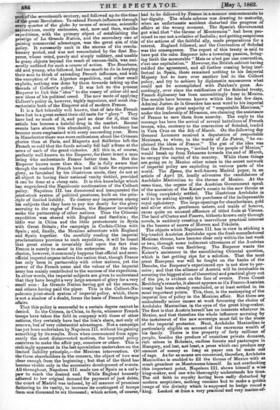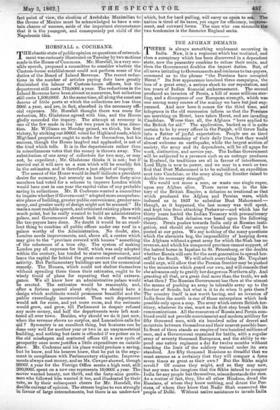THE NAPOLEONIC IDEA IN MEXICO.
TT has lately become the fashion to say that the present 1 ruler of France has no guiding line of conduct in his foreign policy, but gives himself entirely up to the chance of events. That this is a very superficial view of things it is not difficult to demonstrate. Like all men who are not either stubborn fools or desperate gamblers, Napoleon HI. may vary the course of his actions according to circum- stances; yet in the main he steers as straight as any monarch who ever wielded the sceptre of a powerful nation. Looked at from every point of view, the Emperor's foreign policy is very clear and very comprehensible being, in fact, simply a continuation of that inaugurated by Colbert in the latter part.ofthe seventeenth century, and -followed up to the time ofthe great 'Revolution. To extend French influence through every quarter of the globe by meanri,of missions, 'scientific explorations, 'costly embassies, and, now and then, warlike • expeditions, with the primary object of establishing the prestige of La tGrande Nation, and the 'secondary one of gaining commercial advantages, Wag the great aim of this ',obey. it necessarily sank in the storms of the :revolu- tionary period, and was not resuscitated by the first Em- peror, whose ,mind, purely and simply military, rand-unable to ‘grasp Objects beyond the reach of cannon-balls, was emi- nently unfitted for such a.course of Action. 'The Bourbons, old and young, who followed, had too much to ,do in keeping their seat 'to think of extending French influence, 'and with the exception of the Algerian expedition, and other 'small exploits, nothing was -done by them towards taking up the threads of Colbert's policy. It was left to the present Emperor to link this "idea " to the rosary of iother.old and new ideas of his political creed. The new modeef applying Colbert's policy is, however, highly ingenious, and most cha- racteristic both ,of the Emperor.and of modern France. It is a fact tolerably well known, that xf late the French have lost to a great.extent their old taste for "glory." They have had so much of it, and paid so 'clear for it, that the article has become a .hateful drug in the market. Recent events have shown this abundantly, and the tendency has become more emphasized with ,every succeeding year. Even in Manchester there was more enthusiasm about the 'Crimean glories than at Paris, and lVfagenta and Solferino left the French so.cold that the 'funds actually fell half a franc at the news of each of the great victories. All this is, of course, perfectly wellknown to the Emperor, for there isnot a man living who understands France letter than he. But the Emperor knows more than this. He is fully aware that though the modern French have lost all taste for expensive glory, as furnished by 'his illustrious 'uncle, they do not at all 'object to having their national vanity tickled, provided it can he done at a cheap rate. It is this knowledge which has 'engendered the Napoleonic continuation of the Colbert policy. Napoleon III, has discovered and inaugurated the joint-stock system of political greatness, built on the .prin- ciple of limited liability. 'To destroy any impression anaong his subjects that they have to pay -too dearly for the glory accruing to the eagles of France, the Emperor invariably seeks the partnership of other nations. Thus the Crimean expedition was -shared with England and Sardinia; the little war in China and the little protectorate in Syria with Great Britain,; the campaign in Cochin-China with Spain ; and, 'finally, the Mexican adventure with England and Spain together. -On carefully -reading the imperial proclamations previous to each expedition, it will be found that great stress is invariably laid upon the fact that France is merely to assist in the enterprise. At the con- clusion, however, itcommonly happens that official and semi- official imperial organs inform the nation that, though France has only been in partnership with other nations, yet the power of the French name and the valour of the imperial army has mainly contributed to the success of the expedition. mother words, the imperial subjects are given to understand that they have bought a very large amount of glory for a very small sum : La Grande Nation having got all the renown, and others having paid the piper. This is the Colbert-Na- poleonic joint-stock system of imperial policy, which, there is not a shadow of a doubt, forms the basis of French foreign. affairs.
That this policy is successful to a certain degree cannot be' denied. In the Crimea, inChina, in Syria, wherever French. troops have taken the ,field in company with those of other nations, they certainly have had the lion's share, not only of renown, but of very substantial advantages. Not a campaign. has yet been undertaken by Napoleon III. without his gaining something by its results. Even when commenced from appa- rently the most disinterested motives, the imperial policy contrives to make the affair pay, 'somehow or other. This is strikingly apparent in the last speculation Amciertaken on the limited liability principle,—the Mexican intervention, or the three shareholders In the concern, the object of two was clear enough from the beginning ; but that of the third has become visible only in the successive development of events. All throughout, Napoleon III. made use of Spain as a cat's- paw to reach the desired end. While England honestly, adhered to her original demand for payment of just debts, the court of Madrid was induced, by all manner of promises. flattering to its vanity, to increase its contingent of troops from one thousand to six thousand ; which action, of course,' had to be followed by France in a manner commensurate to her dignity. The whole scheme was drawing to maturity, when an unfortunate accident disturbed the progress of affairs at the wrong moment. The Spanish Government got wind that " the throne of Montezuma" had been pro- mised to one not &relative of Isabella ; and gettingsuspicious of the actions of the faithful ally, made preparations for a retreat. England followed, and the Convention of Soledad was the consequence. The report of this treaty is said to have put the calm Emperor into a towering passion, bring- ing forth the memorable " Mais cc n'est pas une convention, e'est une capitulation." However, the British cabinet having ratified the agreement, and all further coaxing being inef- fectual in Spain, there remained nothing to his Imperial Majesty but to turn over another leaf in the Colbert policy,and try to achieve by diplomatic maneeuvres what could not be accomplished with Paixhan's guns. Ac- cordingly, ever since the ratification cif the Soledad treaty, French diplomacy has been unremittingly busy in Mexico.
The results have become known within the last few days. Admiral Jurien de In Graviere has sent word to his imperial master that the great majority of "respectable Mexicans," under the leadership of Miramon, are claiming the assistance of France to save them from anarchy. The reply to the message has been the arrival of several battalions of Fran& troops, who., contrary to the convention of Soledad, landed in Vera Cruz on the 5th of March. 'On the following day General Loreneez received a deputation of respectable Mexicans, to whom, in the words of La Patrie, he ex- plained the ideas of France." The gist of the idea was that the French troops, "invited by the people of Mexico," would break up from Tehuacan towards the end of _March, to occupy the capital of the country. While these things are going on in Mexico other mines in the secret network of imperial policy are exploding in various parts of the world. The .Epoca, the well-'known Madrid paper, in an article of April 28, loudly advocates the candidature of Archduke Maximilian to the throne of Mexico. At the same time, the organs of the Austrian Government speak of the ac,cessioh of the Kaiser's cousin to the new throne as a thing completely settled. The illustrious Archduke is said to be making already his purchases of the indispensable royal upholstery. The large openings for chamberlains, gold and silver sticks, gentlemen ushers, and maids of honour, cause -quite an unusual affluence of titled fools at Vienna. The land ofiCortez and Pizarro, hitherto known only through novels, is suddenly creating a marvellous practical interest in the bosoms of scores of Herren and Fraulein.
'The objects which Napoleon III. has in view in sticking a big-headed Austrian Archduke upon the fresh manufactured Mexican throne, have become clear only within the last week or two, through some indiscreet utterances of the Austrian Premier, Count von Rechberg. The Emperor wants the Kaiser's assistance in the smouldering Oriental question, which is fast getting ripe for a solution. That the next great European war will be fought on the banks of the Danube, the Emperor's experienced eye is not slow to 'per- ceive; and that the alliance of Austria will be invaluable in securing the biggest slice of theoretical and practical glory out of the pie, is evident on the face of events. From Count Rechberg's remarks, it almost appears as if a Franco-Austrian treaty had been already -concluded, or at least settled in its most important points. This, then, is the mainspring of the imperial line of policy in the Mexican affair. But there are undoubtedly minor causes at work favouring the choice of Archduke Maximilian in the eyes of the great king-maker. The first is that Austria herself has no interests whatever in Mexico, and that therefore the whole influence accruing by the instalment of the new sovereign must fall to the share of the imperial protector. Next, Archduke Maximilian is particularly eligible on account of the enormous wealth of his family. Theirs is the property of forty millions of people, besides the produce of countless private domains, rich mines in Bohemia, endless forests and pastu rages in Hungary, and last, not least, a press which can produce any amount of money as long as paper can be made out of rags. As far as means are concerned, therefore, Archduke Maximilian is enabled to fill the throne of Mexico with as much grandeur as Montezuma himself. In not overlooking this important point, Napoleon III. shows himself a wise king-maker, and one who thoroughly understands his time. The old faith in royalty having been sadly disturbed by modern scepticism, nothing remains but to make a golden image of the divinity which is supposed to hedge round a king. Looked at from a very practical and very matter-of- fact point of view, the election of Archduke Maximilian to the throne of Mexico must be acknowledged to have a cer- tain chance of success, aside of the important circumstance that it is the youngest, and consequently pet child of the Napoleonic idea.
































 Previous page
Previous page